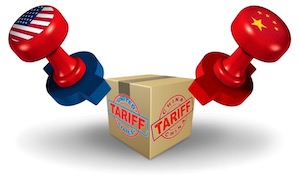By Jennifer Horvath , Partner and
Brandon French , Associate, Braumiller Law Group
Many importers are eagerly awaiting the United States Trade Representative’s (“USTR”) required four-year review of the Section 301 Chinese tariffs. Section 301 of the Trade Act of 1974 grants the Office of the USTR a range of responsibilities and authorities to investigate and take action to enforce U.S. rights under trade agreements and respond to certain foreign trade practices.[1] In 2017, the USTR opened an investigation under Section 301 to determine whether the actions by China relating to technology transfer, intellectual property, and innovation were actionable under U.S trade law. Since the initial investigation, and based on the results of the investigation, the USTR has imposed Section 301 tariffs (ranging from 7.5% to 25%) on four different lists:
- List 1: effective on or after July 6, 2018 with an approximate annual trade value of $34 billion.
- List 2: effective on or after August 23, 2018 with an approximate annual trade value of $16 billion.
- List 3: effective on or after September 24, 2018 with an approximate annual trade value of $200 billion.
- List 4A: effective on or after September 1, 2019 with an approximate annual trade value of $300 billion list ( List 4B did not go into effect).
Because the Lists 1 and List 2 tariffs went into effect in 2018, the USTR is now required by statute to review the necessity of the tariffs continuing. The statute reads:
(c)Review of necessity: (1) If— (A) a particular action has been taken under section 2411 of this title during any 4-year period, and (B) neither the petitioner nor any representative of the domestic industry which benefits from such action has submitted to the Trade Representative during the last 60 days of such 4-year period a written request for the continuation of such action, such action shall terminate at the close of such 4-year period.[2]
Based on the four-year time frame and the written request procedure listed above, the USTR has recently released an FR Notice titled, Initiation of Four-Year Review Process: China’s Acts, Policies, and Practices Related to Technology Transfer, Intellectual Property, and Innovation.[3] The FR Notice indicates that the statutory four-year review will likely be separated into two phases:
Phase 1: The first phase in the four-year review process involves notification to representatives of domestic industries which benefit from the two trade actions under Section 301, as modified, of the possible termination of the actions, and of the opportunity for these representatives to request continuation of the actions.[4]
Phase 2: USTR will announce in subsequent notices whether it has received a request for continuation from a representative of a domestic industry which benefits from an action. If USTR receives such a request, the U.S. Trade Representative will announce the continuation of the action and will undertake a review of the action as described in Section 307(c)(3) of the Trade Act (19 U.S.C. 2417(c)(3)). As part of that review, USTR intends to open a separate portal for interested persons to submit comments on, among other matters, the effectiveness of the action in achieving the objectives of Section 301, other actions that could be taken, and the effects of such actions on the United States economy, including consumers.[5]
For List 1, any representative of a domestic industry which benefits from the Section 301 action may submit a request to continue the action between May 7, 2022, and July 5, 2022. For List 2, any representative of domestic industries benefitting from the Section 301 action may submit a request to continue the action between June 24, 2022, and August 22, 2022. Comments can be submitted by following this link https://comments.ustr.gov/s/. It is also important to note that List 3 and List 4A will not have a separate comment period and instead List 3 and List 4A commentors should submit any comments in support of the tariffs during the List 1 and List 2 comment periods. It is likely the USTR included the List 3 and List 4A comment periods within the List 1 and List 2 time frames to expedite its overall review
Although a majority of importers are hoping the Section 301 tariffs are terminated, others are in the process of preparing a Phase 1 comment requesting the tariffs remain in effect. This may be because certain companies sought alternative sourcing outside of China over the past four years, per the intended impact of the tariffs, and now sourcing from different countries not associated with the tariffs. If this is the case, terminating the Section 301 tariffs might put that company at a competitive disadvantage compared to other companies who still source from China. On the other hand, it is likely importers who would like to see the tariffs be terminated will have the opportunity to comment against the continuation of the tariffs during the Phase 2 process. Within this process, commentors will likely be able to present information relating to the effectiveness of the Section 301 tariffs and other actions that could potentially be taken in lieu of the tariffs. Whether a business is for or against the Section 301 tariffs, it should consider taking this opportunity to submit a comment to the USTR and provide detailed information as to why the tariffs should continue, or why they should be terminated.
For any additional inquiries, or if you would like to discuss submitting a comment relating to the USTR’s four-year statutory review of the tariffs in more detail, please contact Jennifer Horvath at Jennifer@braumillerlaw.com or Brandon French at Brandon@braumillerlaw.com.
[1] https://crsreports.congress.gov/product/pdf/IF/IF11346.
[2] https://www.law.cornell.edu/uscode/text/19/2417.
[3] https://ustr.gov/sites/default/files/301/2022-09688.pdf.
[4] Id.
[5] Id.
Read more articles by this author: https://www.braumillerlaw.com/author/jenniferhorvath/
Read more articles by this author: https://www.braumillerlaw.com/author/brandonfrench/

